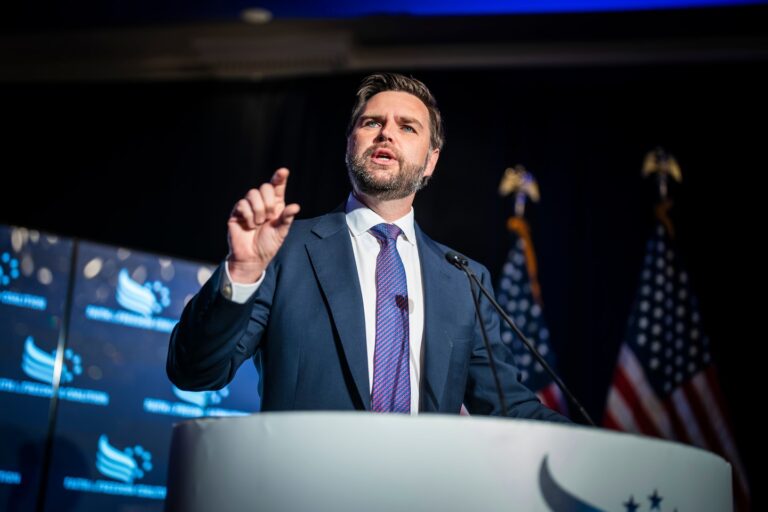But his proposal to reset relations with Russia and distance itself from the Middle East ignores how interrelated these issues are. [Vladimir] “Putin never wants to go to war with China in real life,” a former Trump administration national security official told me. The reality is that if Vance really wants to prioritize China as the biggest threat facing the U.S., abandoning U.S. allies and breaking commitments elsewhere would be the worst way to compete with China or deter Beijing from attacking Taiwan.
Senator Vance often brings up China when arguing that U.S. support for Ukraine should end. At the Munich Security Conference in February, the Ohio senator told European diplomats that the U.S. is not producing enough weapons to support Ukraine while supporting other U.S. partners, such as Taiwan. In a June interview with New York Times columnist Ross Douthat, Senator Vance said the best way to deter Beijing would be to bolster Taiwan’s defenses, but argued that “we’re not doing that because we’re sending loads of weapons to Ukraine.”
While it is true that US arms deliveries to Taiwan are long overdue, it is not due to the war in Ukraine; there is little overlap in weapons systems between the two countries. And if Vance is concerned about US weapons-making capabilities, he undermined the cause by repeatedly voting against the last supplemental national security bill, which included billions of dollars to address that issue, plus additional funding for the Indo-Pacific region.
But where Vance’s vision really falls short is in ignoring how Ukraine’s success in fending off Russian aggression is crucial to deterring a Chinese attack on Taiwan. Don’t take my word for it: just ask the Taiwanese, who have repeatedly argued that Chinese President Xi Jinping would be emboldened if the U.S. abandoned Ukraine.
The fact that Taiwan is supporting Ukraine despite its own national security needs speaks for itself. The Japanese government has made it clear that it believes a Russian victory in Ukraine would destabilize Asia. The South Korean government also supports Ukraine, albeit in a more subdued way. Does Mr. Vance understand China’s deterrent power better than the leaders in Taipei, Tokyo and Seoul? Probably not.
Abandoning Ukraine would likely trigger a crisis of confidence in U.S. resolve and credibility in the Western Pacific. Currently, allies such as Japan and South Korea are counting on U.S. security guarantees to dissuade them from building their own nuclear weapons programs, despite China’s massive nuclear buildup. If that defense umbrella can no longer be trusted, how long will it be before these countries decide they need their own nuclear deterrent?
As if to underscore the risks of a U.S. withdrawal, President Trump himself said in an interview this week that Taiwan “should pay for its defense.” In past interviews, Trump has complained about U.S. military deployments throughout the Pacific and threatened to withdraw U.S. troops if allies did not pay for their defense.
To be fair to Vance, a former Marine, he is not advocating a complete withdrawal of the U.S. from Europe or withdrawal from NATO. He is calling for greater efficiency in defense spending and for Europe to contribute more to its own defense. Matthew Pottinger, who served as deputy national security adviser in the Trump administration, told me he agrees with Vance on these issues and the need for a focus on Taiwan. But the problem, Pottinger said, is that if Russia were to occupy Ukraine, U.S. costs would likely go up, not down.
“If Ukraine collapses, it will become a major front in an axis of chaos, fully equipped with Chinese military power and the weapons of Iran and North Korea,” Pottinger said. “It will be much more costly for the United States and all NATO allies to build and defend a new front than to keep Ukraine in the fight.”
Meanwhile, China is also actively involved in the Ukrainian conflict, supplying Russia with everything but actual weapons. Iran and North Korea are sending Russia countless drones, missiles and artillery shells. Chinese troops have now expanded into Belarus, a Russian ally just across NATO’s borders. Beijing has also grown close to Vance’s favorite illiberal European leader, Hungarian Prime Minister Viktor Orban.
While Vance’s China-only focus may seem appealing to those who agree that China is our biggest foreign policy threat (like me), in practice it would be reckless and counterproductive. If he gets into the White House, our only hope is that Trump, who raves about China but likes to pit government officials against one another, might be swayed by future advisers who understand that the China challenge is a global challenge.

